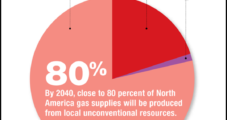By 2025 natural gas is expected to overtake coal as the second most used fuel worldwide and North America will have transitioned to become a net energy exporter, while by 2040 global energy demand will have increased by almost 35% from 2010 levels, according to ExxonMobil Corp.’s Outlook for Energy: A View to 2040, which was released Tuesday.
Worldwide
Articles from Worldwide

Unconventional Gas to Dominate North American Supply by 2040, ExxonMobil Says
By 2025 natural gas is expected to overtake coal as the second most used fuel worldwide and North America will have transitioned to become a net energy exporter, while by 2040 global energy demand will have increased by almost 35% from 2010 levels, according to ExxonMobil Corp.’s Outlook for Energy: A View to 2040, which wasreleased Tuesday.
Scottish Firm: NGV Bus Market Heats Up Globally
The market for natural gas-fueled buses is gaining momentum, according to Alexander Dennis Ltd. (ADL), a Scottish firm that hopes to dominate the sector worldwide. It is touting orders in November for more than 1,000 buses worth $352 million, more than half going to Hong Kong.
Curtiss-Wright Opens Door to U.S. Shale Markets
Engineering company Curtiss-Wright Corp. said Monday it would pay $135.1 million in cash to acquire Cimarron Energy Inc. to gain entry into the U.S. shale oil and natural gas market.
Industry Brief
Alternative fuel vehicle technologies firm Quantum Fuel Systems Technologies Worldwide plans to expand its manufacturing capacity for lightweight, polymer-lined onboard natural gas vehicle (NGV) fuel storage tanks. The carbon composite tanks used in compressed natural gas-fueled vehicles are needed for increased demand from North American original equipment manufacturers of NGVs, the Lake Forest, CA-based tank maker said. Quantum plans to double its production capacity. It will establish manufacturing lines in a 60,000-square-foot building adjacent to its existing 30,000-square-foot factory.
Industry Brief
Without counting the ongoing switch to alternative transportation fuels such as natural gas, nearly 80% of current oil consumption used for transportation worldwide could be eliminated in the next 40 years through aggressive fuel efficiency programs, according to two reports released in Paris by the International Energy Agency (IEA), an autonomous nonprofit organization. The IEA reports conclude that the “right policies and technologies” could improve vehicular fuel efficiency by 50% by the middle of the century. According to the IEA, the transportation sector accounts for 20% of world energy consumption and increased demand in the sector is expected to comprise all future growth in oil use globally. However, the reports contend that there is “massive potential” for fuel efficiency improvements to reduce transport fuel demand. One report, “Technology Roadmap: Fuel Economy for Road Vehicles,” outlines technologies to make vehicles much more efficient by 2030, and the second, “Policy Pathway: Improving the Fuel Economy of Road Vehicles,” outlines policy changes in fuel economy labeling, standards and fiscal policies.
North America Subsea Market Seen Stable, Growing
Between now and 2016, close to $77 billion will be spent on worldwide subsea vessel operations, representing an increase of 63% over the previous five-year period, according to new research by energy adviser Douglas-Westwood (DW). North American spending is expected to total $13 billion, an increase of 23% from the past five years.
Unprecedented Oil Output May Upend Markets, Says Harvard Researcher
Global oil production capacity increases, especially from unconventional U.S. oil, are accelerating so quickly that output could jump almost 20% by 2020, which could dramatically reduce and possibly collapse oil prices, according to an analysis by a Harvard Kennedy School researcher and former oil industry executive.
Industry Briefs
Energy patch communications services provider Texas Energy Network LLC (TEN) has purchased from Verizon Wireless lower 700 MHz A and B block wireless spectrum in the Eagle Ford Shale region of South Texas. The wireless spectrum encompasses 28 counties and will allow TEN to offer service over the entire Eagle Ford Shale play, the company said. “…[I]t will allow us to provide a much needed service to our customers who have been requesting improved communications services in the oilfield for some time,” said TEN CEO Gregory M. Casey. “We intend to build-out our wireless coverage of the Eagle Ford shale region with a 4G LTE network as soon as possible to bring high-speed bandwidth to the region.” The company is currently building a network in the Permian Basin as well. Separately, communications provider ERF Wireless said in April it hired a contractor to build out two high-speed wireless broadband networks in two separate areas of the Permian Basin region adjacent to existing ERF Wireless networks. In addition, ERF Wireless is using its own crews to construct three new networks that are near the extensive terrestrial wireless network system already owned and operated by ERF Wireless in Texas, New Mexico and Oklahoma. ERF is active in the Eagle Ford as well (see Shale Daily, Jan. 13, 2011).
Director Arrested Ahead of House Fracking Hearing
A contentious House committee hearing over an Environmental Protection Agency (EPA) report on possible natural gas contamination of well water started off with the ejection from the hearing room of director Josh Fox of the controversial film, Gasland.




